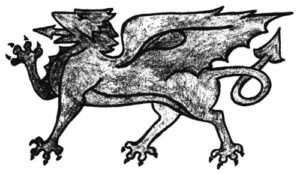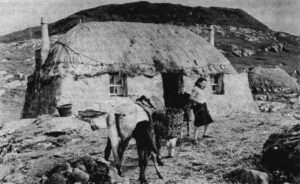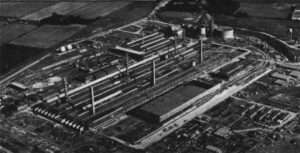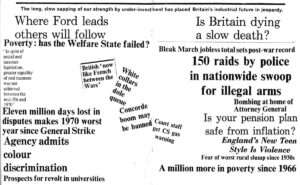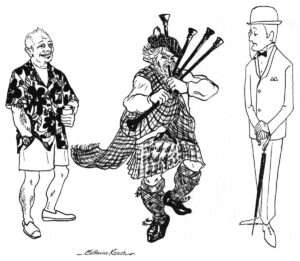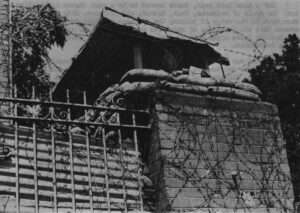Jan. 16, 1971
"No one who has crossed the border from England into Scotland can fail to be aware that in some sense he has come into another country with a life peculiarly its own. He sees around him the symbols of nationality: a flag, a 'national' newspaper press and other communications media…a Scottish Football League, a Scottish Youth Hostels Association., a National Trust for Scotland, a Scottish Opera, a Scottish Television, a Scottish Arts Council, and, of course, a Scottish Secretary of State and a Scottish Office."
(Modern Scotland, by James Kellas)
"Scotland has possessed all the characteristics of a distinct nation since the twelfth century. Today the Scots have their own national church…education system…legal system…banking system…system of central and local government…way of speaking English - even their own Scottish Trades Union Congress."
(Scottish Nationalism, by H.J. Hanham)
Long as these lists are, they are not exhaustive. To them might be added Scottish artists, writers and musicians, Scottish costumes, Scottish banknotes, Scottish sections of the three British political parties, and, of course, a Scottish National Party.
All these are things which make Scotland distinctive. At the same time, they symbolize the differences between Scotland and England or Britain. As the publications of the Scottish Council (Development & Industry) indicate, strong feelings about the differences are by no means confined to those who call themselves Nationalists, or to people who can easily be dismissed as cranks.
But Scotland ceased to be a state 263 years ago. It is not even a state in the sense that members of federal systems are. How then does it happen that after so many years Scotland still has so many national institutions and so strong a sense of national identity?
Part of the answer is that Scotland had acquired a sense of national identity during the centuries it was an independent nation-state, and the identity survived another eight generations because a number of specifically Scottish institutions survived.
Unlike Wales or Ireland, Scotland was not conquered, colonized or annexed. It entered the Union almost as an equal. It was not as rich or as powerful as England, but it had demonstrated in numerous wars that it could not be conquered.
The wars had also demonstrated that The existence of two powerful states on one rather small island was not comfortable for either of them. The move toward Union was eased by the accident that Queen Elizabeth died without an heir, and King James VI of Scotland had an acceptable claim to the throne.
After 1603, the two countries had a single monarch. The reigns of subsequent Stuarts were not happy, but after the civil wars it was clear to many officials that, now that parliaments were as important as kings, two parliaments were a superfluity and inefficient at best.
In 1707, both parliaments consented to a treaty by which they and their respective states ceased to exist, nominally at any rate. Since Scottish members were added to the parliament at Westminster, and since England’s relative power grew, it is not surprising that the English have sometimes forgotten the formal relationship and overemphasized the apparent one.
Still, the Treaty of Union did guarantee the preservation of certain of the trappings of the Scottish state.
Scotland has its own established church (and its own splinter churches) which still differ in form and dogma from the English church. The sheer existence of the Church of Scotland matters, but it is also worth noting that, as James Kellas says: “Scottish Presbyterianism is seen historically in terms of a national struggle against the English Episcopacy, and these myths have a repeated exposition in Scottish schools.” Those schools are also separate.
Scotland has its own judicial system, headed by the Lord Advocate (equivalent to the English Lord Chancellor). It also retains some of its own law: the Not Proven verdict, between Guilty and Not Guilty, is a famous example; less well-known is the survival of part of the feudal land system, under which many home owners are not land owners but are legally “vassals” who must pay annual “feu duty” to the “superiors” who retain full legal control of the land.
In all these areas, differences from English institutions have decreased, for obvious reasons. Churches are much less powerful than they were, and doctrinal conflicts are consequently much less important, though they have by no means disappeared. law and especially civil law must be highly similar in areas as closely linked commercially as Scotland and England. The financial needs of schools at all levels, and the necessity of equipping students for employment in an economy dominated by England, have forced Scottish education to be more and more like the English.
But, particularly in law and the church, neither Scotsmen nor Englishmen can move easily from one system to the other, so these institutions remain Scottish in ways that are obviously and immediately apparent to all.
Education is not so obviously different any more and, at least at the university level, both students and teachers can move without much strain. But a feeling of distinction remains there too, partly because until well into the 19th century Scottish universities were considered, and not only by Scots, to be better in some areas than English universities. The opposite view is more common now, but the past glory can still be pointed to with pride, while the decline can be transmuted into a present grievance – if the English had not been so dominating, our universities would still be great.
As the quotation above about Presbyterianism indicates, another aspect of Scottish education is important. The schools teach history. They teach Scottish history, and UK history from a Scottish point of view. They inform all students that the law, the church and the schools are distinctive, and so they help keep the concept of Scotland alive.
Unless Scottish students are very different from others, the concept acquires an emotional component. It is, for example, hard not to take sides a little while studying the Scottish War of Independence against England in the 14thcentury, or the debates that went on before the Treaty of Union was accepted. (There is evidence that some legislators who voted for Union were bribed. Has any reader not some time found himself in a heated argument over whether a particular instance of bribery was a “sell-out” or “just an accepted part of politics” in its place and time?)
In government and politics, distinctions are still less clear cut. The Treaty of Union did preserve aspects of local government (for instance, the rights of royal burghs) but, except for creating the unified British parliament, it said nothing about central government.
With England increasingly the more powerful partner, there has been strong pressure on politicians to seek advancement in London and through the British parties. On the other hand, there have always been Scottish interests which had to be represented. Eighteenth century wool taxes affected Scotland and England differently. The collapse of the Highland economy in the 19th century led to creation of the first regional development agency and passage of a law giving crofters what is still unique tenure of their land. In the 20th century, Selective Employment Tax, stop-go economic policies, British Standard Time, and the debate over entering the Common Market, have all had different impacts in Scotland and England.
In the late 19th century, at the height of Britain’s wealth and power, and of England’s domination of both, there was a move to emphasize Britishness and to de-emphasize Scottishness. Some people conscientiously referred to Scotland as a region and addressed letters to “Edinburgh, North Britain.”
It is unlikely that the movement would have got very far anyway, but in the event it disappeared under the wave of Home Rule agitation. The importance of Home Rule in Wales has been noted (SK-1). It may not have been as crucial in Scotland, but it still had a major impact.
The post of Secretary of State for Scotland had been abolished at the time of the last Jacobite Rebellion in 1745. Administration in many fields remained more or less Scottish, but without ministers in the government to keep it under Parliamentary scrutiny or to reform it now and then. From the 1850S on, there was growing discontent over alleged misgovernment, or sheer lack of government, and a rising demand for re-creation of the post of Secretary of State, In the 1880s, the discontent was swelled by analogy and alliance with the Home Rule movement.
In 1884, Gladstone created the Scottish Grand Committee which, though it later lapsed, was revived and is now a permanent standing committee of Parliament. In 1885, he agreed to reestablish the Secretaryship. It is a measure of the strength and breadth of demands for it that the post was actually created a year later under a Conservative government.
In 1886, Gladstone converted to Home Rule for Ireland, and he did not stop there. He went on, in speeches and a pamphlet, to argue that the whole structure of British government should be reconsidered, and that if any part of the state were to be given Home Rule, perhaps all parts – Scotland, Wales, and England – should be given the same. That same year, the Scottish Home Rule Association was formed. While it was never able to command as broad a following as the movement for a Secretary of State had, it did have a good deal of power because it was so closely tied to the Liberal Party that it was almost a front group.
Just why it took another 30 years to win passage of the ill-fated Irish Home Rule Bill is not clear to me. Perhaps such a far-reaching change must arouse so much concern, raise so many other issues, and threaten so many interests, that it can never be achieved quickly except by violence.
In any case, the bill was not passed until the eve of World War I, and after that Scottish and Welsh nationalist movements were divided (see SK-1). But “North Britain” talk has never revived, and there has been no time since 1886 when there was not a nationalist political organization in existence in Scotland.
Meantime, the authority of the Scottish Secretary has grown, and since 1926 he has always been a member of the cabinet. His department is an oddity in British government (as is the more recent Welsh Office) for it is responsible for a geographic region, rather than a function like defense or health. The Scottish Office includes divisions of Home and Health, Education, Agriculture and Fisheries, and Development, and so includes functions of what are separate departments elsewhere in Britain.
The Scottish Office is an anomaly, which means that wholly conflicting arguments can be made about it. Thus: the Office is evidence that the central government is willing to decentralize real power and to develop new administrative forms to satisfy national desires; or, the Office is merely an administrative mess that has no real power because the Treasury controls its finances and the stronger, better-staffed, separate departments actually determine what is done in their fields.
But there is wide agreement that the Scottish Office provides a core of government – real or symbolic – that had been lacking. It also gives nationalists some ammunition, for they can point to it and say that the administrative framework and expert staff of an independent government are already present.
Finally, Scottish economic life has remained somewhat separate from that of England. Scottish farming is less devoted to crops and more to meat and wool. Mining has long been a more major part of industry. So has heavy engineering, including shipbuilding which is not only more important and obvious than in England, but is also one of the things to be pointed to proudly – after all, the Queen Mary and the old and new Queen Elizabeth were built in Scotland.
Other distinctions can be found or created, as we will see later, but I don’t think they are as major as some that have been mentioned. With the exception of Scotch whiskey, there does not seem to be anything about Scottish products or industry that could not have been accommodated easily enough to a “regional” rather than a “national” identity. But they occur in a context that makes them Scottish too, and then they become significant in their own right.
Each of these institutions is distinctive, and they all reinforce one another so that each is more distinctive than it would be alone. Yet it seems clear that no one of than was necessary to maintain a sense of difference, and that fewer of them would also serve, though presumably the more there are the stronger their effect is.
Comparison with Wales is interesting. Wales was never a fully unified independent state. It was conquered and annexed. There was a king who is sometimes considered “Welsh” – Henry VII, who was a descendant of Owen Glendower – but he was never king of Wales and he hardly lived there at all.
When Wales was annexed, it had few distinctive institutions. But, some such institutions have come into existence since the Act of Union.
Welsh education is not legally separate, but the University of Wales, and particularly the college at Aberystwyth, has been strongly affected by the circumstances of its founding, in the 19th century, in opposition to English education and out of concern for the Welsh language. At all levels, though not in every school, the language, and Welsh history, are now taught.
There is no Church of Wales, but neither is the Church of England established there. Methodism and other varieties of “non-conformism” took root more strongly in Wales than in England, and they combined with the Home Rule movement in a natural alliance against England and England’s church, and achieved disestablishment of Episcopalianism in 1920.
In government, Wales did not differ from England for the first 428 years after Union. Only in 1964, in response to wide demand, was the Welsh Office established. It is now growing in authority and responsibility in the same way the Scottish Office did, but faster since it would be too anomalous if the two departments were unlike each other as well as unlike the rest of government departments. It is already the subject of the same kinds of arguments as the Scottish Office is.
In politics, Wales has differed from England for many years, but only to the extent that first the Liberals, and later Labor, got a much larger percentage of the vote there than in England. Recently, Plaid Cymru has become a force to which the other parties must pay some attention. Like the Scottish National Party, its existence depends on contrasts with England but also increases the contrasts.
Welsh economic experiences have been somewhat different from those of the English as a whole. For example, industrialization came into an economy characterized by peasant agriculture much more than England’s was. It also brought even more human and environmental destruction (strikingly evoked in How Green Was My Valley and several novels by Alexander Cordell).
Note that these are differences between all of Wales and all of England, or Wales on the average and England on the average. Some parts of England experienced much the same thing. But in Wales, they happened in a context where the comparison was between Wales and England, rather than between Wales and “other regions” of England.
The distinguishing factor for the Welsh seems to be cultural. That is a problem, for it is harder to describe that sort of difference than to contrast laws or churches or costumes. The books mentioned above, the poetry of Dylan Thomas, or Welsh singing, cannot be described (not by me anyway), but their distinctiveness can be felt when they are experienced.
The most obvious example of culture is language. It has been left until last because it is in fact only one example. It is the one usually cited about Wales, but that is more because it can be cited in a single phrase than because it is the only, or most important, example. No one needs a long supporting argument to be convinced that peoples who speak different languages are different in an important way. Singing is not so obviously a matter of importance.
Of course, it is also true that language has become an issue. That is there is debate over whether or not Welsh should be preserved, demonstrators engage in civil disobedience to support demands for greater use of Welsh in government offices, political candidates may be asked what they will do to help extend Welsh teaching to more schools. To some degree that is also true of the culture as a whole, but the topic is not as easily debated if only because few people are prepared to attack an entire culture. As issues, they reinforce the sense of distinctiveness, for even a non-speaker of Welsh who opposes preserving the language can only enter the debate in terms of Wales versus England.
But before language became an issue, I think it and the whole culture survived largely because they were isolated. There was little Welsh schooling, but there was less English. Much of Wales (and this may also be said of parts of Scotland) was not linked closely to England and did not experience England’s political and economic changes until the 19th century.
Industrialization and the extension of suffrage, for example, came into a society where economic and social relations, and feelings about them, were very different from those in England. To take one illustration, working for wages was far less common in Wales in the late 18th and early 19th centuries, and the changeover entails drastic reorientation in basic social relations.
Because those charges occurred in a different cultural setting, they were seen differently and they have had different effects. One of the effects was the creation of the forces that have brought into existence such distinctive institutions as the Welsh Office. Now they are part of the cultural setting.
Welsh nationalists say, “No language, no nation.” To the extent that they mean, as many do, “No culture, no nation,” they are no doubt correct. But it seems possible that the language, or any other aspect of the culture that existed in the past, may no longer be crucial.
In Scotland, Gaelic was common at the time of the Union but is spoken by less than 2 % of the population now. Yet Scotland remains a nation without its language. (But not entirely without a language issue. There is a language society, An Comunn Gaidhealach (The Highland Society), and there is a rather small movement for a Gaelic school.)
What seems to be happening in Wales is a transition that is marked by, but not confined to, the development of distinctive institutions. To whatever extent the language does survive, it will of course play a role. But the sense of difference that already exists might well be sustained even if the language disappeared altogether.
Received in New York February 23, 1971
©1970 Scott Keech
Mr. Keech, a free-lance writer, is an Alicia Patterson Fund award winner. This article may be published with credit to Mr. Keech and the Alicia Patterson Fund.

